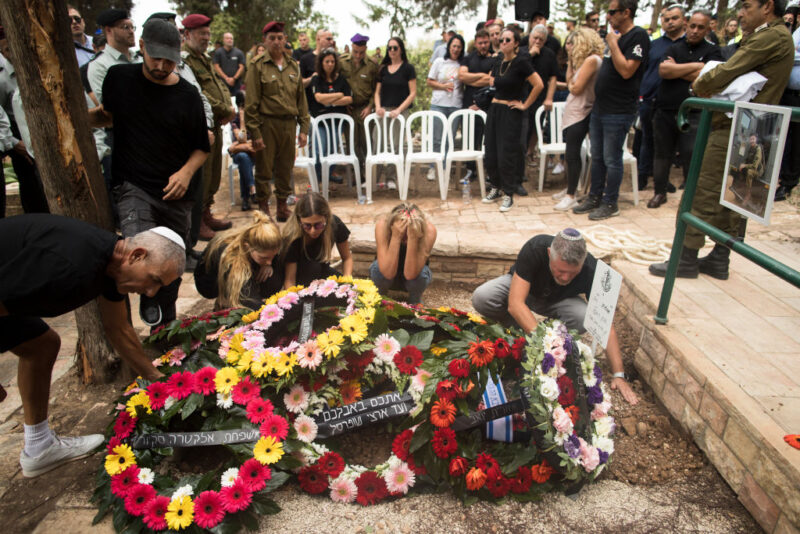Opinion
What now
After unthinkable horror, a new Jewish paradigm
In Short
For many Diaspora Jews, the events of the past weekend were their first experience with the brutal reality of an all-out war against the Jewish State.
Unlike any moment since the 1972 Munich Olympics, the scope and depth of violence directed against the Jewish people last weekend has never been so dramatic.
Hamas’ pogrom against Israel represents another dimension of conflict and war. The actions of their foot soldiers were not merely the tactics of a military operation or even terrorism, but a concerted effort to annihilate Jews. Its boldness and ruthlessness served as an intentional statement that Jews are expendable.

Family and friends of fallen IDF soldier Afik Rozental, who died in a battle with Hamas terrorists, attend his funeral on October 9, 2023 in Kfar Menachem, Israel. Photo by Amir Levy/Getty Images
Those who planned this campaign came with an agenda. Their goals were multiple. First, they are committed to never allow Israel to achieve peace with its Arab neighbors, and most particularly with Saudi Arabia. A second objective is designed to undermine the confidence of Israelis in the ability of their government and military to protect them. A third outcome is to remind the Palestinian people that Hamas alone can defend and advance their interests.
The imprint of the past few days will be remembered, certainly by Israelis and Jews the world over; but it must also be understood as well by governments and peoples worldwide, as it serves as a political statement that such indiscriminate carnage represents a new crude form of warfare and terror from Hamas.
The impact of this moment may well rewrite the course of Israeli history and politics. No doubt it will also contribute to an essential reconnect between Israel and its Diaspora partners. If one could believe that the political tensions pitting Israelis against one another for the past year were driving a wedge between the Jewish homeland and its Diaspora partners, then the events of this past weekend will leave no doubt that the Jewish people are unified in their common commitment to the security and continuity of the Zionist experiment.
This moment in time will reignite a central belief that Israel’s survival remains a core Jewish value, as thousands of Jews are and will be rallying on behalf of Israel. This renaissance of commitment could not come at a more strategic moment, reminding us that even as we have encountered division and political disconnect, when Jews are facing an external threat their bond with each other will prevail.
The tasks ahead will demand a different leadership paradigm. Beyond the immediate and long-term imperative to support healing for the physically and emotionally wounded in the aftermath of this war, our funders and leaders need to consider they are dealing with two distinctive generational populations.
For those who have previously experienced the war and terror that shaped Israel’s evolution, there will be a need to provide renewed hope and a way forward.
For those who are new to this experience, who are scarred and shaken in a different way by the weekend’s events, our leadership must be able to link them not only to Jewish history but to an appreciation of how as a people and nation-state we can constructively move forward.
Jewish history becomes an essential tool for all of us, as we extract from our people’s journey through time and place lessons on how we have survived, and even flourished, even as we have experienced threats to our existence and role in the world.
Drawing on this tragedy will allow both legacy and boutique organizations a window to connect with young Jews. A new Jewish community relations strategy will also need to be introduced, where the case of Israel must be recast in light of these new realities.
We have the opportunity to not only connect with unaffiliated and disconnected Jews but also have the occasion to draw closer those who were already deeply committed. There will be a search for meaning in the aftermath of these events. The ability to give context and direction will be a centerpiece of how we as a community connect with fellow Jews.
As with the Six-Day War and the Yom Kippur War, we are dealing with an existential moment. Following those historic events, Jews from different backgrounds helped to reframe the Jewish philanthropic and political story of their support for Israel. How we inspire, inform and engage Jews will define how history will record our role in helping to rebuild the Diaspora-Israel connection.
Steven Windmueller is a Jewish communal professional and a scholar of contemporary political issues and American Jewish affairs. He is a professor emeritus at the Hebrew Union College-Jewish Institute of Religion in Los Angeles.












